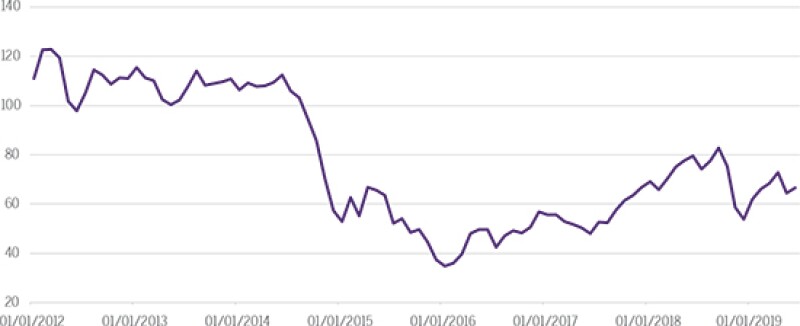As part of the G20/OECD Inclusive Framework's ongoing work on BEPS, the OECD released its Programme of Work to Develop a Consensus Solution to the Tax Challenges Arising from the Digitalisation of the Economy on May 31 2019. This followed the February 13 2019 issuance of a public consultation document, and a Policy Note released on January 29 2019 on Addressing the Tax Challenges of the Digitalisation of the Economy.
Although the titles of the publications focus on addressing the tax challenges raised by the digitalisation of the economy, the programme of work is expected to have an impact on all sectors including where digitalisation is not necessarily thought of as a key factor. One such sector is the energy and resources (E&R) industry, which encompasses the oil and gas, mining and metals, and power and utilities subsectors.
The E&R sector has several unique features that have historically affected the design of tax regimes. Digital elements have to date not played a significant role in the sector's success but this does not mean that changes arising from the OECD Inclusive Framework work will not be relevant.
Overlaying proposals to the E&R sector
The G20/OECD programme of work identifies three approaches to be explored, with the goal of developing a consensus-based solution to expand the taxing rights of market/user countries in particular.
User participation
This proposal focuses on highly digitalised businesses where user participation is deemed to represent a significant contribution to value creation. This is perhaps the proposal that will have the least impact on the E&R sector, with potentially no impact at all – it is hard to think of instances in which E&R groups have a 'user base' as envisaged by the OECD.
Marketing intangibles
This approach would apply to all types of businesses, whether highly digitalised or not, and would extend taxing rights to market jurisdictions where products are sold under the assumption that local marketing intangibles are generating non-routine profits in relation to that jurisdiction.
In this way, a business that derives revenues from sales and marketing activities targeting a market jurisdiction in which it does not have a taxable presence (or where it operates through a limited-risk distributor), may be required to attribute profits there to reward the use of marketing intangibles. Although many countries in the world consume E&R products such as oil and iron ore, most sales tend to be focused in a few select geographies.
Assessing the importance of marketing intangibles to the overall business will be key under this approach and, in the case of the E&R sector, this exercise will not be without its challenges, considering the relevance of these assets to the value generated in the overall supply chain (discussed below).
Under the 'significant economic presence' approach, a taxable presence would arise when there is a purposeful and sustained interaction with the country through digital technology and other automated means that would be considered to constitute a significant economic presence. Different options will be considered under the programme of work as to how profit should be allocated to the significant economic presence. This could include a fractional apportionment method, whereby the tax base could be determined by applying the global profit rate of a group to the revenues generated in a jurisdiction, and then apportioning the tax base using an agreed weighting of allocation keys, such as sales, assets, employees and users.
In the E&R sector, an allocation based on a fractional apportionment in the manner envisaged could pose some challenges because it may see an overweighting of value to the 'back end' of the supply chain. Further, groups with substantial levels of vertical integration in their activities may well find it difficult to slice profit through the several stages of their own value chain, considering the refinement or modifications products are subjected to along the way.
Moreover, the high-risk nature of some of the activities undertaken by companies in the sector have often led E&R players to establish joint ventures (JVs). The JVs are intended to diversify risk, generate synergies and amass efficiencies deriving from economies of scale and a more optimal use of the production factors. Any formulaic approach adopted under the tax digitalisation initiative will need to take into account JVs in the definition of the 'global profit' to be allocated to the several jurisdictions, especially if part of the business of a given multinational enterprise (MNE) is conducted in association with more than one joint venture partner.
How is value created in the E&R sector?
To better frame the discussion of the OECD's programme and its potential impact on E&R businesses, it is important to understand how this sector is broadly organised and structured. A simplified value chain for the production of energy products and the exploration of other resources (such as metals) is presented in Figure 1.
The E&R value chain relies, in the first instance, on the ability of exploration and prospecting activities to find reserves whose extraction can be economically viable.
Figure 1 – E&R value chain

Then comes the production and operations stage, during which the discovered reserves are extracted from the ground. This happens once the economic agent engaged in the extracting activities has obtained a licence from local governments to operate and deploy the significant investment in the infrastructure and assets needed for the production and processing of the raw materials extracted.
The capital-intensive nature of these activities, combined with the finite nature of the resources and the significant volatility of prices in global markets for the products, makes this a high-risk business. Finding customers for the goods extracted (and then refined) comes after the most substantial investments have already been made.
A key characteristic of this industry is the price volatility experienced by many commodities. Indeed, price risk is arguably the industry's key risk, as prices set on the global markets will vary considerably throughout time. To demonstrate this, Figure 2 shows the Brent crude price over the past few years.
Despite the price volatility usually observed in the markets, when it comes to the trading of commodities, traditional marketing intangibles (such as a brand) are often considered to have limited value.
Figure 2 – Brent crude prices (USD per barrel)

Source: uk.investing.com/commodities/brent-oil-historical-data
Another important issue for the E&R sector related to market presence is how recurring losses caused by extended periods with low prices in the market, and by cyclical macroeconomic shocks, would be regarded by the potential new rules, considering the recurrence of these events in the industry.
Although the programme is clear in stating the importance for the new profit allocation rules to effectively apply to both profit and loss-making positions, it is unclear at this stage how the OECD Inclusive Framework will explore the different options available for the treatment of losses under the new taxing rights.
Another key consideration is the industry lifecycle. The value chain in the E&R sector includes long periods of pre-production and post-production, during which no revenue is earned – the exploration/development and the decommissioning stages. For example, when oil and gas fields end production, their associated facilities need to be dismantled and disposed of or decommissioned. A strict legal framework of national, regional and international regulations governs how disused facilities are decommissioned. When a mine reaches the end of its useful life and extracting activities have ceased, a restoration of the land disturbed by mining operations is required to make the land safe and available for use by future generations.
The approaches presented in the programme do not address the influence that the industry lifecycle will have on profits generated by businesses across the industry supply chain, even though a special treatment of the losses that these events create has been considered appropriate in the tax regimes of most production countries.
Interaction with upstream taxation regimes
Companies in the oil and gas sector are at present often subject to special ring-fence rules, specific taxation regimes and also concession agreements negotiated on a medium- to long-term basis. These rules are linked to the rights to extract hydrocarbons from the ground and are a supplementary set of rules that apply in addition to the country's general corporate tax rules.
Taxation in the mining sector often involves a complex interaction between general tax codes, mining codes, export duties and bilateral tax and/or stability agreements. These ensure businesses pay taxes required by local governments in host countries and contribute to the development of local communities.
It will be important for the new tax digitalisation framework to ensure appropriate alignment between the new taxing rights and the existing upstream taxation regimes in place.
After the G7 meeting in France in July 2019, government representatives reaffirmed the importance of their close cooperation to address existing and future challenges. Representatives shared their commitment to work together to improve the international tax framework and urgently address the tax challenges raised by the digitalisation of the economy.
In the E&R sector, the programme of work has the potential for taxable profits to be transferred from producing countries to destination markets. This is problematic insofar as the industry often operates in developing countries that have reasonable expectations of obtaining relevant amounts of tax from the exploration of their finite natural resources.
Therefore, it is important for there to be an effective tax dispute resolution mechanism through mandatory arbitration to avoid double taxation.
Is an exemption for the E&R sector possible?
Some observers have wondered if the programme of work is really expected to apply to the E&R sector, and have assumed that some form of exemption will be adopted. This matter is addressed by the programme, which states that the design of scoping limitations may be appropriate to guide the application of the new taxing rights and that due consideration will be given to the sale of certain items such as "commodities and other primary products".
The OECD programme offers no specific guidance as to whether an exemption may be agreed to by the Inclusive Framework, but it is an action the industry likely would welcome.
The way forward
The E&R sector could be significantly affected by the expansion of new taxing rights, and it could potentially be affected by double taxation if global coordination is not reached at the conclusion of this OECD/G20 project.
Further, the sector's specific characteristics arguably warrant a more detailed discussion of the applicability of the proposals, considering the dynamic between producing and market countries, the reduced link between value creation and market intangibles in the sale of commodities, and the need to manage the connection between any new taxing rights and existing upstream taxation regimes. This is an area for all industry participants to watch closely.
Aengus Barry |
|
|---|---|

|
Partner Deloitte UK T: +44 20 7007 4331 Aengus Barry joined Deloitte UK's TP team 16 years ago. Since joining, Aengus has spent a significant portion of his career assisting clients in the energy and resources industry. He has particular experience in complex energy and resources pricing projects. He has used risk pricing statistical techniques to support the marketing margins retained by mining groups and has worked on one of our most difficult diversionary LNG cargo pricing assignments. Aengus has experience delivering a broad range of TP services, from documentation and compliance reports to IP planning and debt pricing projects. He has worked on a number of advance pricing agreements (APAs) and has built experience of wider international tax issues through participation in several tax structuring projects. Aengus holds bachelor's and master's degrees in economics. He is a CFA charter holder and was awarded the ATT qualification. |
Sérgio Moreno |
|
|---|---|

|
Associate director Deloitte UK T: +44 20 7007 2575 Sérgio Moreno is an associate director of Deloitte's TP team based in London. Sérgio has specialised in transfer pricing since he joined Deloitte Portugal in 2008. He has worked on numerous TP projects for clients based in several jurisdictions (Portugal, Angola, Cape Verde and the UK) and his professional experience has been focused on helping groups devise optimised TP policies; restructure intragroup transactions between related entities; review internal pricing procedures and operational controls; and prepare transfer pricing documentation on a global scale. Sérgio has also assisted companies in advance pricing agreement (APA) negotiations, TP disputes and debt pricing and structuring projects. He has worked with a range of clients across a number of sectors and has experience working with companies in the energy and resources sector. Sérgio has a bachelor's degree and a master's in management. |
© 2019. For information, contact Deloitte Touche Tohmatsu Limited.
This communication contains general information only, and none of Deloitte Touche Tohmatsu Limited, its member firms or their related entities (collectively, the ‘Deloitte network’) is, by means of this communication, rendering professional advice or services. Before making any decision or taking any action that may affect your finances or your business, you should consult a qualified professional adviser. No entity in the Deloitte network shall be responsible for any loss whatsoever sustained by any person who relies on this communication.













